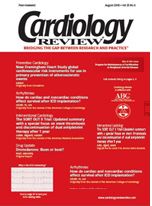Catheter ablation reduces AF recurrences
Arrhythmias
Orlando—A single session of catheter ablation combined with antiarrhythmic drug therapy is superior to antiarrhythmic drug therapy alone for preventing recurrence of atrial fibrillation (AF) in patients in whom drug therapy has failed previously, said Emanuele Bertaglia, MD, at the American College of Cardiology Annual Scientific Sessions 2005. He presented data from a randomized, controlled, multicenter study of catheter ablation to treat patients with AF.
“Up to now, the efficacy of catheter ablation of AF was demonstrated only in observational, noncontrolled, nonrandomized studies,” said Dr. Bertaglia, chief of the electrophysiology laboratory at Civic Hospital of Mirano in Venice, Italy. He noted that catheter ablation was still not mentioned in the most recent guidelines for the management of patients with AF.
In the study, 137 patients with paroxysmal or persistent AF who were intolerant of antiarrhythmic drugs or in whom at least two trials of antiarrhythmic drug therapy had failed were randomly assigned to ablation plus antiarrhythmic drug therapy or to drug therapy alone (control group). Antiarrhythmic drug
therapy in most patients consisted of amiodarone (Cordarone, Pacerone).
The efficacy of each treatment was assessed using more than 100 electrocardiograms (ECGs) per patient over the 12 months of follow-up. The assessment included basal ECG and Holter monitoring, in addition to telephonic ECG monitoring during the first 4 months of follow-up. The primary end point was total absence of atrial tachyarrhythmias during this period.
Ninety-one percent of the control group had at least one AF recurrence compared with 44% of the ablation group (P < .001). In a Cox proportional hazards model, the risk of recurrent AF was 3.2 times greater in the control group.
The finding in favor of catheter ablation was impressive considering that “these were the worst patients that we could find in our clinical practice,” said Dr. Bertaglia. “Their mean age was 62 years, they had a long history of AF of about 6 years, and in the mean they had failed at least three antiarrhythmic drugs.”
The rate of major complications was 5.8% in the control group and 5.9% in the ablation group. In the ablation group, there was one stroke, one transient phrenic nerve paralysis, and one pericardial effusion related to the ablation procedure.
The long-term efficacy of catheter ablation was not affected by the interruption of antiarrhythmic drug therapy, raising the possibility that antiarrhythmic drugs may not be needed in patients with AF who undergo successful ablation, said Dr. Bertaglia. A follow-up trial comparing catheter ablation with or without the help of antiarrhythmic drugs has been started, and results are expected in 2009, he said.
The strength of the study was the intensive ECG monitoring, which allowed detection of both symptomatic and asymptomatic AF recurrences, whereas previous trials of catheter ablation for AF relied solely on the number of symp-tomatic AF episodes as an end point, commented Jeffrey Goldberger, MD, as-sociate professor, Feinberg School of Medicine, Chicago.
